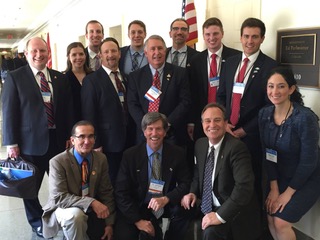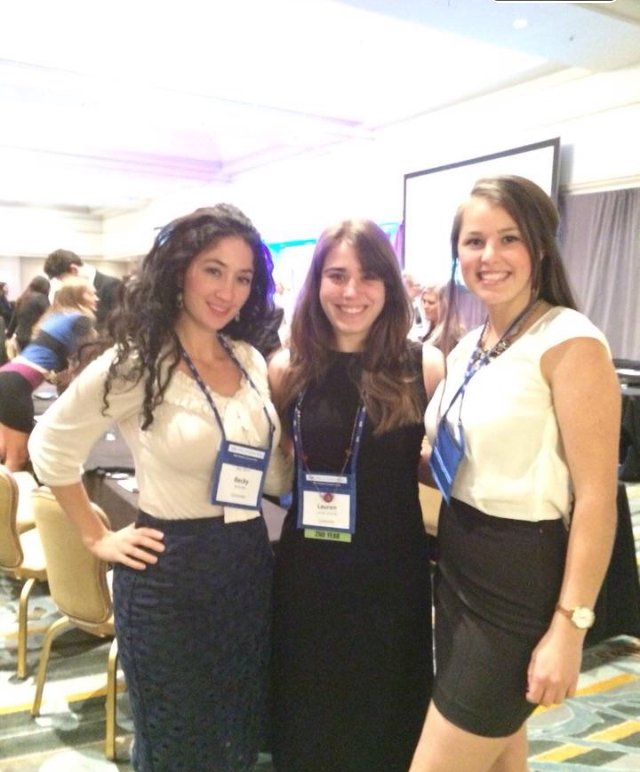by Jake Holtzmann
The Warmup
This morning, before I sat down at my ‘work from home’ desk to write this piece for my friends and colleagues at CU, the U.S. death toll from the COVID-19 Pandemic officially reached 100,000 lives lost. To preface my thoughts on the topic of this blog post, I’d like to acknowledge our community during this difficult time. My thoughts are with each of you, hoping that you’re well, and hoping that those you love are safe. I hope that today, if even for just a moment, you can free your mind to dream with me – of life after COVID-19, of our future role as oral healthcare providers, and of the lives that we could save with dental administration of critical vaccines – perhaps even a future SARS-CoV-2 vaccine.
As dental students, we have joined the world on an unprecedented journey into uncharted territory. A journey that none of us thought we’d ever have to take, but one that requires us to be bold, collaborative, and forward thinking. If you’re like I was two months before I sat down to write this piece, you’d never considered the possibility of dentists giving the vaccinations that you’re so accustomed to receiving from your primary care provider. However, as I hope to share with you today, when you dig deeper into the literature, policies, and legislation fueling this growing push to expand our profession’s scope of practice, you begin to consider, “maybe this is possible.”
The Supporting Literature
After reviewing the literature re: Dental Administration of Vaccines, I think it’s important to note the scarcity and specificity of the literature currently available. Because our current scope of practice already includes preventative screenings for, and education about, head and neck cancer, studies have largely been specific to the potential role of dental providers in HPV (Human Papillomavirus) vaccine administration. This specificity within the research should help us focus our advocacy efforts in the future as the dental profession takes small steps toward this noted dental scope expansion.
Specifically, HPV continues to be implicated in oropharyngeal cancer oncogenesis (Pinatti et al., 2018). Following the development of the new Gardasil-9 HPV vaccine, which is expected to protect against the “HPV types that cause ∼93% of head and neck cancers” (Zhai & Tumban, 2016), Primary Care Providers (PCPs) have been taking steps to educate and vaccinate their patients using recommended dosing schedules – which, depending on the patient’s age, typically involves two or three separate doses administered within a much shorter timeframe than a typical yearly check-up at their PCP’s office.
As of 2015, high rates of HPV vaccination had not yet been achieved despite strong endorsements by the medical community (Sussman et al., 2015). While completion rates of the scheduled dosing sequences are already thought to be low (Elsamadicy et al., 2019), completion rates have been found to be significantly lower in racial and ethnic minority populations (Agenor et al., 2020, Spencer et al., 2019), serving as yet another striking example of the systemic inequality in our healthcare system that contributes to the disparate health outcomes of marginalized communities. Studies have found that challenges associated with healthcare delivery (Sussman et al., 2015) such as the consistent scheduling of patients to complete their HPV vaccination dosing outside of their yearly check-ups remains the greatest barrier to community HPV vaccination.
Current literature specifically related to the dental profession has explored the dental community’s willingness to be educated and integrated into the effort to vaccinate against the virus. Promisingly, “a majority of oral health students may be open to receiving training to administer the HPV vaccine and to administer the HPV vaccine once they are trained” (Kepka et al., 2019). The literature also notes that any such expansion of our scope of practice “would require a strong statement of support by professional organizations” (Young et al., 2015) like the American Dental Association and, yours truly, the American Student Dental Association.
Before moving on, as studies have concluded that some dentists might be hesitant to administer HPV vaccines due to a perceived increase in liability (Daley et al., 2014), I wanted to note that after rigorous analysis, the CDC concluded that there is no evidence to suggest any causal link between the Gardasil-9 vaccine and any deaths reported to the Vaccine Adverse Event Reporting System (VAERS).
The Policies and Legislation
Figure 1
Following publication of the noted literature, the American Dental Association acted accordingly in 2018 by authoring a new policy designed to push dentistry forward into the space of HPV vaccinations (see Figure 1). To date, the American Student Dental Association has not yet put forth their own policy encouraging dental schools to include vaccination sciences and training into their curriculums.
While no push has been made at the federal level to educate, equip, and empower dentists to provide HPV vaccines to our patients, so far three states have passed such legislation. To date, the states of Minnesota (150A.055 Administration of Influenza Immunizations) and Illinois (1220.403 Dentists Administering Flu Vaccines) allow licensed dentists, who undergo additional training, to administer Influenza vaccines to patients that are 19 years or older and 18 years or older, respectively.
In response to their state’s low vaccination rates, the state of Oregon set the bar even higher in 2019 by passing House Bill 2220, enabling qualified dentists to administer any type of vaccine. In order to implement this legislation, the Oregon Board of Dentistry is expected to develop rules and guidelines, while the sole dental school in Oregon (Oregon Health & Science University) is expected to provide training to dentists interested in administering in-office vaccinations. As a sponsor of House Bill 2220, the Oregon Dental Association President James McMahan stated that “We sponsored House Bill 2220 to increase access to care, providing additional opportunities for patients to receive life-saving vaccines from highly trained practitioners they already know and trust.”
The Challenges Ahead
While appreciating the progress that some states have made in passing promising legislation, it would be irresponsible of us to ignore the challenges that must certainly be overcome before a nationwide effort to include the dental profession in vaccine administration is realized.
As noted in an opinion piece published by Dr. Joseph Kwan-Ho in the ADA News, “statewide implementation of a dental vaccine program poses several barriers.” Most notably, I’ve reasoned that a few such barriers could include: a lack of standardized training to address the logistical and financial difficulties of supplying, storing, and administering vaccines in a “cold chain”, whether warranted or not, perceived liability resultant from vaccine administration, and lastly, a lack of universally standardized medical record interoperability, which was exacerbated by the high number of different digital record companies born from the Health Information Technology for Economic and Clinical Health Act of 2009.
The Endgame
Progress on this scale – implementing vaccination protocols, infrastructure, and practices in dental offices all around the country – is slow. So where can we start? The literature, American Dental Association, and expert testimony all point us in the same direction: HPV vaccination.
As healthcare providers that claim the oral cavity as “our” domain, and as healthcare providers that have the unique opportunity to build trusting relationships with our patients through more frequent appointments than Primary Care Providers, no one should be more qualified and equipped to discuss, recommend, and administer HPV vaccines to prevent the future development of oral cancer than us. Every year, around 10,000 Americans die from oral or oral pharyngeal cancer (The Oral Cancer Foundation). Of those that die from oropharyngeal cancer, 70% die due to the Human Papillomavirus (National Cancer Institute). A strong, collective commitment by dental organizations, dental schools, and dental practices to future advocacy efforts at the state and federal levels could change that.
When I chose to pursue a career in healthcare, just like you, I did so to care for my future patients. Every day, I’m inspired by our colleagues and our mentors that care for their whole patient, not just their teeth. During a pandemic of such devastating proportions, we’re reminded of the importance of public health. While we scramble to keep up with our clinic requirements and stay “Safer at Home” for online learning, I hope that we can all renew our commitment to the public health of, and advocacy for, our communities and the public healthcare system that was so nearly overrun by COVID-19. In the event that an effective vaccine is developed for the SARS-CoV-2 virus, I believe that policies like the one put forth by the ADA and legislation similar to what has been passed in Oregon could serve as a foundation for us to supplement and alleviate the stress on our public healthcare system by administering SARS-CoV-2 vaccines.
So, is the dental profession ready today to partner with our medical colleagues to distribute life-saving vaccines?
Not yet. But we can change that.
About the Author
As a former University of Denver Pioneer and current second-year dental student at CU, Jake Holtzmann currently serves in several capacities within the American Student Dental Association. In one of his roles, a Legislative Coordinator for the Council on Advocacy, Jake employs his passions for public health, research, and organized dentistry to coordinate advocacy efforts by dental schools in Colorado, Texas, Oklahoma, Nebraska, Missouri, Iowa, and Minnesota. A Colorado native, Jake loves to ski, travel, and visit breweries in his free time. Oh, and one time he attempted to eat a massive cheeseburger made of eight half-pound patties… he failed.

















